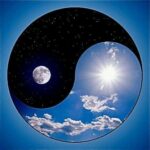In most religions there are 2 main definitions of the “after -life”. The first one is a heaven (or hell). the second one is where one beliefs in reincarnations.
Although we want to avoid any discusions on which of both is true. Withing stirngism we can determine that both are possible but we have a tendency to believe more in the part of reincarnation.
Heaven or hell
the concept of heaven and hell is understood in a slightly different way compared to traditional interpretations. In this belief system, as one’s body and soul separate at the time of death, the soul’s strings and essence begin to float and disengage from the physical vessel. During this floating state, the events and experiences that have generated a significant number of strings in one’s life, along with the connections and effects these events had on others, can create a phenomenon akin to heaven or hell.
In Stringism, the quality of the strings formed by events in a person’s life is taken into account. If one has lived a life filled with wrongdoing and actions that caused harm to others, the resulting strings are imbued with negativity and stress. These negative strings are intertwined with the strings of those who were affected by those actions. Consequently, the connections between these strings can create a state of suffering or punishment for the soul, akin to the concept of hell.
Conversely, when a person’s actions are characterized by compassion, kindness, and positive contributions, the resulting strings carry a more harmonious and enlightened energy. These strings are connected to the strings of those who have been positively impacted. The interwoven nature of these connections can create a state of enlightenment or heaven for the soul.
Furthermore, it is possible that due to the interconnectedness of strings and souls, multiple souls can go through these phases together, forming knots of strings that create a shared experience of heaven or hell. This shared experience reinforces the understanding that our individual actions have an impact on the collective consciousness and the interconnected web of existence.
In essence, within the framework of Stringism, heaven and hell are understood as states that can arise from the quality and interconnections of strings formed by one’s actions and their effects on others. It emphasizes the importance of cultivating positive, compassionate, and ethical behaviors to create a harmonious and enlightened state for the soul and its connections with others (afterlife).
Reincarnation
In Stringism, we embrace the belief in (partial) reincarnation as an integral part of our spiritual understanding. While concepts of heaven or hell can exist as transitional states, they are not seen as the final destination. We perceive the process of reincarnation as the knotting together of strings to form a new being. When this vessel ceases to exist, the strings gradually detach and drift away. The duration of this process depends on the willingness of the strings to let go, akin to a lingering ghost that remains until its unresolved issues are addressed.
As the strings drift apart, they contribute to the creation of the vast universe of things. However, these drifting strings can also be attracted to new beings, leading to instances where individuals may possess insights into events from the past. This occurs when circumstances align in such a way that an individual collects a significant number of strings that were previously intertwined with another being. These strings carry the essence and experiences of the earlier being, allowing for glimpses into their past.
It is important to approach these insights with an open mind and discernment. While they can offer valuable glimpses into the interconnected nature of existence, it is also crucial to consider alternative interpretations and the limitations of such experiences. Each individual’s journey is unique, and the interplay of strings can result in diverse manifestations of connections to past events.







